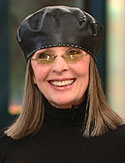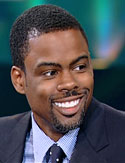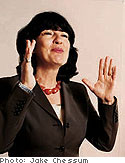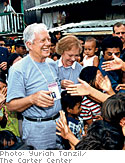
We know it when we see it, and we love the people who live it—the ones we
can count on, always, to be brazenly, exhilaratingly themselves. Authenticity is
funny, provocative, and it slices through the bull. Celebrate some of the greats
with us!
Diane KeatonHere's a tip for when you get to talk with Diane Keaton. Yes, she's agreeable to chat with and she's got a good, un-actressy laugh. But no matter how subtle you think you are, don't try to lure her into a discussion of her own genuineness.
If you're a woman in middle age—or a man, for that matter—you couldn't find a stronger model of independence, accomplishment, and self-respect. Keaton has never married, despite (because of?) her relationships with Woody Allen, Warren Beatty, and Al Pacino. She's had four Oscar nominations—and won for 1977's Annie Hall, Allen's stylized portrait of her. (Keaton, like Annie, wore men's trousers, vests, and ties then, and she was born Diane Hall.) She professed that she was over romantic love, and in her 50s she adopted two children. At 57 she did her famous nude scene with Jack Nicholson in 2003's Something's Gotta Give. Now 61, she's had no tinkering done to her beautifully aging face. When would she find time, anyway? Her latest film, Because I Said So, came out in February 2007, and she's completing a photography book—she's already published several. Until recently, she's been directing and producing in both film and TV. Of course, she's also a mother, so while she'll still take acting gigs, directing again "is going to have to wait for maybe two years."
But don't even imply that you might be implying that she might be a model for anyone. Say, by mentioning her well-known attitude toward cosmetic surgery. "I don't have an attitude toward cosmetic surgery," she cries. "What can I say? I'm not telling anybody else what to do. I don't know how I might feel at 70. I think I might feel better about myself if I kept that authenticity, but..." Well okay; at least she said the word authenticity. Guess she's not telling 57-year-olds to do a nude scene either, huh? But surely that must have been a personal breakthrough? "No. I didn't like it," she says. "But it was appropriate to the story. And it was funny. My body really doesn't matter—I want to take good care of it, but it's simply what it is. I don't have the expectations I used to have, and I'm not as concerned about privacy."
Is it clear by now that Keaton wouldn't want somebody rhapsodizing about the authenticity she's too authentic to talk about? So let's just note that in 1968, when she was in her early 20s, Keaton performed in the original Broadway cast of Hair—and she was the only one not to take off her clothes in the first-act finale. Different ages, different attitudes, different choices, same person all along.

Chris Rock
There's an adage among stand-ups that says it takes 10 years to come up with a good 10-minute set. Every three or four years, Chris Rock delivers an excellent hour of fresh material—what he calls his state of the union address.
Like all great comedians, Rock is an acute observer of the human condition and a serious man. His stand-up confronts uncomfortable issues, among them race ("Every town has the same two malls: the one white people go to and the one white people used to go to") and class ("There are people who would like to get rid of minimum wage. But we have to have it, because if we didn't some people would not get paid money. They would work all week for two loaves of bread and some Spam"). He's funny, but he doesn't hesitate to serve up the provocation straight: "The government doesn't give a f*** about your safety. They sell guns at Wal-Mart; they don't give a f*** about you!" His voracious performances do triple duty, enlisting, dissecting, and amusing his targets—us—all at once.
Rock grapples with what strikes him: A hunch turns into a premise, a stranger's gesture suggests a character, the two—over months—become a bit. ("I need to get it out, and it takes me a long time to get the material to the level I feel.") Right now he's mulling over America's devaluation of intelligence. "We have no idea who's smart; we only know who's rich," he says. He's worried about the chilling effect of the "gotcha!" culture of cell phone films. He's disturbed by how our national obsession with celebrity distracts us from the war. His bits may start off quietly, but by the time they reach an audience, they're fierce.
When he writes, he cranks up Prince for inspiration. "He reinvented himself," says Rock. "Different albums, different sounds." Rock's own versatility cuts across genres, including successful scripts for TV and film. His goals are as expansive: "I am into showing black people in any way that we're not being seen." But while he gleefully eviscerates the media—the culprit behind stereotypical portrayals of black people—no one is spared his scrutiny. ("Get real! When I'm looking over my shoulder at an ATM machine, I'm not scared of the media!")
Rock feels an artist's obligation is to express, unhindered, his God-given gift. Fame is incidental. The common man's church is the comedy club. Words are powerful, and Rock labors hard to get the most from them. "You spend your whole life biting your tongue," he says. "You're married, you're biting your tongue. You go to work, you're biting your tongue. So it's nice to go someplace to see some guys and women exercise free speech. And if it's funny, even better."
There's an adage among stand-ups that says it takes 10 years to come up with a good 10-minute set. Every three or four years, Chris Rock delivers an excellent hour of fresh material—what he calls his state of the union address.
Like all great comedians, Rock is an acute observer of the human condition and a serious man. His stand-up confronts uncomfortable issues, among them race ("Every town has the same two malls: the one white people go to and the one white people used to go to") and class ("There are people who would like to get rid of minimum wage. But we have to have it, because if we didn't some people would not get paid money. They would work all week for two loaves of bread and some Spam"). He's funny, but he doesn't hesitate to serve up the provocation straight: "The government doesn't give a f*** about your safety. They sell guns at Wal-Mart; they don't give a f*** about you!" His voracious performances do triple duty, enlisting, dissecting, and amusing his targets—us—all at once.
Rock grapples with what strikes him: A hunch turns into a premise, a stranger's gesture suggests a character, the two—over months—become a bit. ("I need to get it out, and it takes me a long time to get the material to the level I feel.") Right now he's mulling over America's devaluation of intelligence. "We have no idea who's smart; we only know who's rich," he says. He's worried about the chilling effect of the "gotcha!" culture of cell phone films. He's disturbed by how our national obsession with celebrity distracts us from the war. His bits may start off quietly, but by the time they reach an audience, they're fierce.
When he writes, he cranks up Prince for inspiration. "He reinvented himself," says Rock. "Different albums, different sounds." Rock's own versatility cuts across genres, including successful scripts for TV and film. His goals are as expansive: "I am into showing black people in any way that we're not being seen." But while he gleefully eviscerates the media—the culprit behind stereotypical portrayals of black people—no one is spared his scrutiny. ("Get real! When I'm looking over my shoulder at an ATM machine, I'm not scared of the media!")
Rock feels an artist's obligation is to express, unhindered, his God-given gift. Fame is incidental. The common man's church is the comedy club. Words are powerful, and Rock labors hard to get the most from them. "You spend your whole life biting your tongue," he says. "You're married, you're biting your tongue. You go to work, you're biting your tongue. So it's nice to go someplace to see some guys and women exercise free speech. And if it's funny, even better."

Christiane Amanpour
Iranian-bred, educated at the University of Rhode Island, Christiane Amanpour makes London the base from which she travels the world. Serious, elegant, and brainy, she crosses boundaries and bridges cultures with confidence and humanity. For all her worldiness, she radiates an unaffected composure that seems to flow from a core of self-knowledge.
I began by wondering if she thought of authenticity as a matter of personal identity, moral integrity, or journalistic independence. Her own work for CNN has been distinguished by a combination of all three. "I think of it as a commitment, a passion," she said. "Seeking and trying to tell the truth. Truth is important in a world that is changing so constantly and so quickly. And searching for authenticity becomes even more urgent in a world increasingly dominated by virtual reality."
Is there a self-defining moment she looks back on? "I began to develop a very focused sense of purpose when I was about 20," she said. "That's when the Islamic Revolution turned my world upside down. I lost friends and family, my home and possessions. The revolution propelled me to where I am today: trying to make sense of our world. My commitment is to constancy. I don't think I have substantially changed the way I report a story or how I think or how I look or dress.... I have not changed what I believe about truth, integrity, morality, and duty." Is there a price to pay for that commitment? "Yes," she mused, "but not a heavy price. People don't always like to hear the truth. But I've chosen a profession that is the truth business. It guides everything I do, even when I'm not on the air."
Still...isn't there ever a conflict between her role as a journalist and her feelings, political or otherwise? "No. I am not a political person. I am a fact-based reporter, not a pundit. What I do is not based on opinion, and that provides a very clear compass." It must take tremendous courage to do the work she does, I said. "I suppose courage is an ingredient," she agreed. "But something kicks in—you don't think about it. The war zones I've lived in for the past 17 years have taken their toll, physically and emotionally. You do need stamina and determination to endure. But my work is about reporting what I see—shining a light on those places shrouded in darkness and those people who need a voice. Believing in that completely helps you to survive."
Iranian-bred, educated at the University of Rhode Island, Christiane Amanpour makes London the base from which she travels the world. Serious, elegant, and brainy, she crosses boundaries and bridges cultures with confidence and humanity. For all her worldiness, she radiates an unaffected composure that seems to flow from a core of self-knowledge.
I began by wondering if she thought of authenticity as a matter of personal identity, moral integrity, or journalistic independence. Her own work for CNN has been distinguished by a combination of all three. "I think of it as a commitment, a passion," she said. "Seeking and trying to tell the truth. Truth is important in a world that is changing so constantly and so quickly. And searching for authenticity becomes even more urgent in a world increasingly dominated by virtual reality."
Is there a self-defining moment she looks back on? "I began to develop a very focused sense of purpose when I was about 20," she said. "That's when the Islamic Revolution turned my world upside down. I lost friends and family, my home and possessions. The revolution propelled me to where I am today: trying to make sense of our world. My commitment is to constancy. I don't think I have substantially changed the way I report a story or how I think or how I look or dress.... I have not changed what I believe about truth, integrity, morality, and duty." Is there a price to pay for that commitment? "Yes," she mused, "but not a heavy price. People don't always like to hear the truth. But I've chosen a profession that is the truth business. It guides everything I do, even when I'm not on the air."
Still...isn't there ever a conflict between her role as a journalist and her feelings, political or otherwise? "No. I am not a political person. I am a fact-based reporter, not a pundit. What I do is not based on opinion, and that provides a very clear compass." It must take tremendous courage to do the work she does, I said. "I suppose courage is an ingredient," she agreed. "But something kicks in—you don't think about it. The war zones I've lived in for the past 17 years have taken their toll, physically and emotionally. You do need stamina and determination to endure. But my work is about reporting what I see—shining a light on those places shrouded in darkness and those people who need a voice. Believing in that completely helps you to survive."

Jimmy Carter
The qualities that were so maligned during Jimmy Carter's presidency—his modesty, his faith in the democratic process, his collaborative approach to problem solving—now define his reputation as a remarkable man. His Christianity wasn't always well regarded, nor was his affinity for the little guy, and many critics mistook his considered approach for weakness. But he pressed on, and at 82, he's still doing his life's work his way. He uses the power of his rarefied position to move the mighty, and through the Carter Center, his nonprofit organization, manages to keep his feet on the ground: monitoring elections, training farmers, promoting programs to foster peace and health. He can righteously claim to have ended the suffering of millions; thanks to efforts by the Carter Center, the incidence of guinea worm disease—a horrible parasitic infection that's been around for more than 2,000 years—dropped from 3.5 million in 1986 to slightly more than 10,000 in 2005. And so the peanut farmer from Plains, Georgia, population 614, is no longer served up as the subject of jokes.
Carter traces his convictions to his mother (a registered nurse who joined the Peace Corps in her 70s) and Rachel Clark, his honorary mother, an African-American neighbor who taught him what he calls the real facts of life: "how to relate to the environment, how husbands and wives relate, that strong people don't have to abuse weak people to show their strength." Some of the rockier times of his years in office had to do with his devotion to Mrs. Clark's quiet pragmatism; his gentle presentation wasn't welcome in a commander in chief. Yet he consistently delivered on the beliefs he voiced (one example: appointing a record number of women and minorities to high-ranking governmental jobs and judicial posts).
Carter and his wife, Rosalynn, still live in the same home they raised their kids in. Like plenty of husbands, he spends free time in the garage. Since leaving the White House, he's made more than 150 pieces of furniture, some of which are auctioned off to fund human rights initiatives. "People like to have something built by a former president," he says with a trace of wry bafflement. They pay upwards of a million dollars for these pieces. But he's proudest of the cradles he's made for his grandchildren and great-grandchildren—gifts of labor that are implicitly hopeful, comforting, and of use. He's fond, too, of a coffee table he crafted from the trunk of a walnut tree. Roots are what he draws strength from, and what he always returns to. He'd like to be buried in front of his house, in the rich soil of land that has been in his family since 1833.
The qualities that were so maligned during Jimmy Carter's presidency—his modesty, his faith in the democratic process, his collaborative approach to problem solving—now define his reputation as a remarkable man. His Christianity wasn't always well regarded, nor was his affinity for the little guy, and many critics mistook his considered approach for weakness. But he pressed on, and at 82, he's still doing his life's work his way. He uses the power of his rarefied position to move the mighty, and through the Carter Center, his nonprofit organization, manages to keep his feet on the ground: monitoring elections, training farmers, promoting programs to foster peace and health. He can righteously claim to have ended the suffering of millions; thanks to efforts by the Carter Center, the incidence of guinea worm disease—a horrible parasitic infection that's been around for more than 2,000 years—dropped from 3.5 million in 1986 to slightly more than 10,000 in 2005. And so the peanut farmer from Plains, Georgia, population 614, is no longer served up as the subject of jokes.
Carter traces his convictions to his mother (a registered nurse who joined the Peace Corps in her 70s) and Rachel Clark, his honorary mother, an African-American neighbor who taught him what he calls the real facts of life: "how to relate to the environment, how husbands and wives relate, that strong people don't have to abuse weak people to show their strength." Some of the rockier times of his years in office had to do with his devotion to Mrs. Clark's quiet pragmatism; his gentle presentation wasn't welcome in a commander in chief. Yet he consistently delivered on the beliefs he voiced (one example: appointing a record number of women and minorities to high-ranking governmental jobs and judicial posts).
Carter and his wife, Rosalynn, still live in the same home they raised their kids in. Like plenty of husbands, he spends free time in the garage. Since leaving the White House, he's made more than 150 pieces of furniture, some of which are auctioned off to fund human rights initiatives. "People like to have something built by a former president," he says with a trace of wry bafflement. They pay upwards of a million dollars for these pieces. But he's proudest of the cradles he's made for his grandchildren and great-grandchildren—gifts of labor that are implicitly hopeful, comforting, and of use. He's fond, too, of a coffee table he crafted from the trunk of a walnut tree. Roots are what he draws strength from, and what he always returns to. He'd like to be buried in front of his house, in the rich soil of land that has been in his family since 1833.




